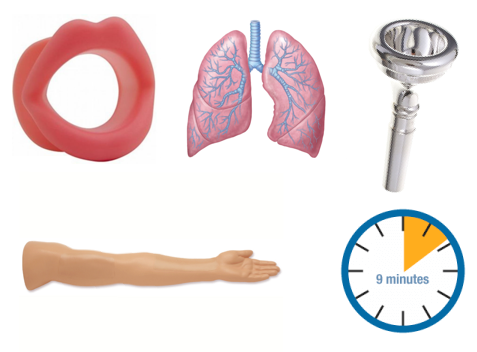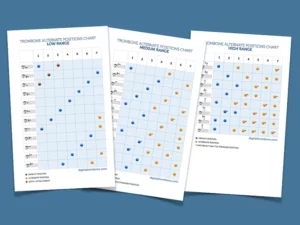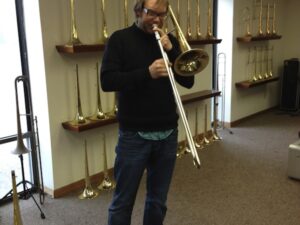
Can you buzz? This is why you should! And how to. And how not to.
Now I believe I figured out how to approach it. This is really helping my trombone playing, hope it will help yours too! I recommend that you spend the first nine minutes of your trombone practicing on this.
Ingredients:
– a (not stiff) upper and lower lip
– 1 or 2 lungs
– 1 trombone mouthpiece
– 1 arm with hand attached (or a mouthpiece stand)
– 9 minutes of precious time

Combining lip and mouthpiece buzzing
Lately, I have been experimenting with a combination of lip buzzing and mouthpiece buzzing. It has proven to be a great way to build up embouchure, as well as kick-starting the lips. Using the lips attached to my specific body, I have found that lip buzzing somewhat equals mouthpiece buzzing one octave higher. In other words, a phrase played on the mouthpiece should be buzzed one octave lower on the lips to be comparable.
Buzz right or go to bed
Years ago, I occasionally did some lip buzzing trying to expand my high range. I once did this before a gig in the same dressing room as a really (as in really) good trumpet player, and he noted that I was able to lip buzz much higher than him. Since he has a world-class embouchure and plays effortlessly in any range, it got me thinking. I had seen him do some lip buzzing and noticed that his buzzing sound was much richer and mellower than mine. This got me thinking, and I realized that I was actually buzzing all wrong!
Buzzing high notes
In the old days, in order to buzz those high notes, I pulled my lower lip slightly in, while making my embouchure wider. This is an excellent way to make sure that your lips don´t vibrate freely, and the wide embouchure is a no-go on any brass instrument. (Do NOT make your embouchure wider when playing high notes. NEVER-EVER! Lips are not guitar strings that vibrate faster when they are tightened more. It is all about shaping air.)
Low range buzzing
In the lower register, I let my lower lip loose, in order to make it vibrate slower (and thus more easily). I have found that THIS is the way to go with lip buzzing. I don´t mind that I lost an octave or three by only buzzing like this (and high note buzzing won’t turn you into a chick magnet anyway).
Open throat and relax
I use lip buzzing to make sure my body is approaching brass playing the right way. You should go for an open feel in the back of your throat. When you find that sensation, make sure to hold on to it. That is why it is a good idea to avoid high-range lip buzzing. That tends to build up tensions in your body, and we don´t want that.
My upper range of proper lip buzzing ends around a Bb (above the top staff line in bass clef). I can squeeze higher pitches out, but I find that counterproductive for my trombone playing. Instead, focus on expanding the low range. I find that lip buzzing in the pedal tone range is great for both embouchure control and opening up your sound.
Start buzzing
Try playing a mid-range note on the mouthpiece, and remove the mouthpiece while playing. This is the embouchure you should use when lip buzzing too. Of course, you will have to move your lips closer together than when playing on the mouthpiece, or there will be no sound.
Now, forget all about trying to play high notes when lip buzzing. The risk of squeezing those higher notes out by forcing air out is way too big. Don´t go there.
In the video below, I show you how not to buzz, as well as how to do it right. Just go with the thumbs up or down and you will know which is which. Also notice that when I buzz the same phrase on the mouthpiece one octave higher, I use the same amount of effort.
What to buzz
When using the mix of lip and mouthpiece buzzing as a warmup, I either play the same phrase in different octaves, or I start at the same note and play scales or arpeggios either down (lip buzzing) or up (on the mouthpiece) from that note. As a variation to standard major scales, you could pick a scale you want to dig deeper into, maybe a whole note scale or an altered scale. Or work on a tricky chord that you want to get more familiar with.
Below are some samples of what you can play. Don´t just go with that, put some thoughts into it, and come up with things that suit your level of playing.
Download exercises as pdf file
Before you jump into playing all sorts of exotic scales, make sure your lip buzz is working properly. Start by lip buzzing a selection of long notes in a comfortable range before moving on. Just a few long notes might be enough for the first few days, don´t push it. Some can hardly buzz but are still great trombone players. If you are one of them, this might not be the exercise for you.
Need more? Trying buzzing easy melodies on both lips and mouthpiece in different octaves! Or try sight-reading music. If you do improvising, try playing simple blues solos with a play-along track.
The nine-minute time frame
In my opinion, this is a great way to start a beautiful trombone day. Nevertheless, this is only a fraction of what you should be working on to become a good player. So how do you make sure this is a nine-minute warmup? Set an alarm clock, and move on to the next set of vital trombone tricks when the clock starts buzzing too…
Buuuuuzz on!
Anders Larson
3 Comments
-
I’ve been practicing the trombone for a long time now buti’ve never been able to buzz properly. My colleagues have shown how to do it but it has always been a failure.
I hope the above leson and the demo:video will teach me how to buzz efficiently.
Thank you! -
Thanks you for this. I have been buzzing the “thumbs down” way for years, the way I was taught. I am going to give this a good try. Like most I am trying to expand range and stamina. Being a senior you sometimes question whether it is even possible to build more strength. That is not going to stop me from trying!
-
HELP!!! I need to do an assignment for my 6th grade band teacher, and I play trombone, I’m using Smart Music, and it keeps counting my notes wrong! I can’t seem to do it right, and my assignment is due at 12:00 pm on Sunday October 9th, 2016. PLEASE HELP





